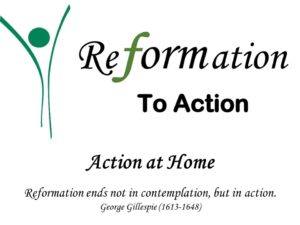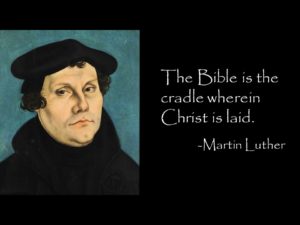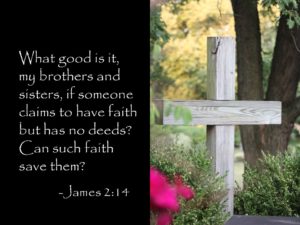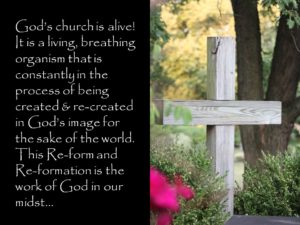Martin Luther once wrote: “God does not need your good works, but your neighbor does”. This week you are invited to reflect on your own experience of responding to God’s call to action to live out our faith in the world.
This morning we begin our Stewardship emphasis in a fitting way, with a claiming of our Lutheran heritage under the theme “Reformation to Action”. As many of us have watched the various Luther videos that have come out this year – from Rick Steves’ film to the recent PBS special to the current Adult Learning series, “A Man Named Martin” – we can all agree that Luther was anything but passive.
Luther’s faith and hunger for learning and right living in the church was active and alive and burning. For Luther, Reformation was not an intellectual exercise alone – it was more of a contact sport – one that was seeking change and renewed life for the church and its people.
Now, whether you are a life-long Lutheran with generations of Lutherans behind you or whether this is your first time in a Lutheran church, the legacy of faith you are invited into is not clear cut, black and white – instead, it is messy, it is active – it is faith seeking understanding through learning and debate and service. Doubts and questions are welcome. Openness and honesty are valued. These are all hallmarks of being Lutheran.
In this series, we are inviting Gloria Dei members to share their own experiences. Some will be in written form, so please pay attention to your in-box or mail-box in the coming weeks. Others will be shared in worship in a variety of ways.
This morning we will be focusing on the belief and understanding that God calls us to invest our time, talent and treasure for the sake of our neighbors. I am grateful to have Briana and Julia Schanke with us this morning to share their thoughts and experience with us.
Before they come forward, I’d like to delve into Luther just a little bit this morning, particularly on the book of the Bible that Luther called an “epistle of straw” – and by the way, that was not some kind of 16th century compliment for the Book of James.
This stands in contrast to another well-known quote from Luther that reads:
“The Bible is the cradle wherein Christ is laid”.
From those words we get just a glimpse of the esteem that Luther held for Scripture. For him, the Bible was the authority on which the Church was built – therefore teaching that did not have God’s work in the world at its core was dismissed by Luther.
For this reason, Luther did not find value in all books of the Bible. He struggled with the usefulness of four of them – Hebrews, James, Jude and Revelation. In fact, he would have preferred that they not be included in the Bible at all, and for his own part, he moved those four to the very end of the German-language Luther Bible.
In the case of the book of James, Luther’s objections were really on theological grounds. The foundation of his theology was St. Paul’s emphasis on faith and not works as the key to salvation. In Luther’s reading of James, he found the exact opposite – works were paramount.
However, what he may not have taken into account was the context in which James was written. As like many New Testament letters, James wrote to a church in crisis.
Rich brothers and sisters in Christ were treating poorer brothers and sisters in Christ badly. Rich Christians were being shown preference in the congregation without concern for those among them in need.
Are you beginning to sense the conflict?
And, if there is any place in the world where people, regardless of circumstance, are all supposed to be celebrated as sons and daughters of God, created in the Image of God…it’s the church.
This all leads into the verses we have heard today:
What good is it, my brothers and sisters, if someone claims to have faith but has no deeds? Can such faith save them? (James 2:14)
It turns out that this is the passage that really teed off Luther and led to his “epistle of straw” conclusion. On its own, it would seem to contradict Paul’s emphasis on faith as a gift of God, but when you remember what is going on when James is writing his letter…can one say that the people in that church were being faithful? Treating the poor with contempt, and treating the rich and powerful with deference…does this sound like Jesus?
James isn’t making a great, nuanced theological point here. He’s looking at the behavior of the people in the church, and he’s saying that he doesn’t see much faith, if any.
For James, if you’re going to claim to be a faithful Christian, there should at least be some evidence there. An attempt to bring in the reign of God – so that God’s will can be done on earth as it is in heaven.
James wasn’t telling the church to be good to the poor and thereby earn salvation. He was saying that if their faith was genuine, they’d actually be loving their neighbors as themselves.
Martin Luther, himself, echoed these sentiments when he wrote:
God does not need your good works, but your neighbor does.
All of this leads us to reflecting on our own experiences of responding to the call to action to live out our faith in the world. I would now call on Briana and Julia to share their story.
God’s church is alive! It is a living, breathing organism that is constantly in the process of being created and re-created in God’s image for the sake of the world. This Re-form and Re-formation is the work of God in our midst – and it has the power to shape us and change our view and understanding of the world around us – and what God is calling us to be and to do.
This is the messy, active, contact sport of a faith tradition that has been passed to us – that we have been invited to engage – the place where doubts and questions are welcome, where openness and honesty are valued – the place where God meets us with fierce love and never-ending grace.
Amen.
Rev. John Berg
Gloria Dei Lutheran Church, Northbrook, IL
Resources:
Rick Morley, A Garden Path
Follow the Royal Law – a reflection on James 2:1-17, August 29, 2012






